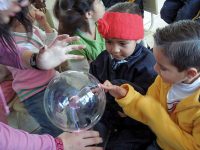Interview with Gunnar von Heijne
«The Nobel Prize writes the history of science»
Secretary of the Nobel Committee on Chemistry (Sweden).

Every year around October, the world’s media prepare to report on an event with few competitors in terms of relevance and scope: the announcement of the Nobel Prizes by the Royal Swedish Academy of Sciences. Behind what is undoubtedly one of the most important awards in the world there is a very complex process involving months of work by people who also enjoy the recognition of the international community for their contributions in the fields of economics, literature or science.
This is the case of Gunnar von Heijne (Gothenburg, 1951), professor of theoretical chemistry at the University of Stockholm and current secretary of the Nobel Committee on Chemistry. With a master’s degree in chemical engineering from the Royal Institute of Technology in Stockholm, in 1980 he completed his doctorate in theoretical physics at the same institution, at which time he was already interested in the study of the three-dimensional protein structures, an area in which he would eventually specialise. He explains that his research into proteins in the cell membrane came about by chance: while doing his doctorate, he wanted to continue studying French, the language he had learned in high school. So, to get some practice, he subscribed to La Recherche, a monthly scientific journal published in France since the 1970s, where he saw a cartoon that caught his eye. The interactions between a chain of proteins and a cell membrane seemed a little suspicious to him. «I did not quite understand it. It had some references, so I kept digging and I am still interested today», he explains. The cell membrane proteins, in simple terms, could be defined as the gateway to and from the cell for both information and nutrients. To study them, Professor Von Heijne and his team have successfully combined theoretical methods with biocomputing techniques (such as the development of software to predict the so-called «signal peptides» of proteins which is still being used and receives regular updates), as well as experimental laboratory studies to confirm their predictive models.
«If one really were to abide by Plan S, there would be very few sites to publish papers»
His research career has been accompanied by significant responsibilities: among other positions, from 2006 to 2015 he was the Director of the Centre for Biomembrane Research at the University of Stockholm, and he currently holds the same position at the National Cryo-EM Centre at SciLifeLab, the leading Swedish institute for molecular biosciences. After being consulted by the Nobel Committees on Chemistry and Physiology and Medicine on several occasions, he became a member of the Royal Swedish Academy of Sciences in 1997. In addition to being a key voice in the selection of Nobel laureates, Professor Von Heijne has also received numerous awards: among the most recent, in 2018 he received the Novozymes Prize from the Novo Nordisk Foundation, and in March 2019 he was named Doctor Honoris Causa by the University of Valencia, proposed by the Department of Biochemistry and Molecular Biology. On the occasion of his visit to Valencia, we met with him the day before the nomination ceremony to discuss his research and also the difficult task of proposing a Nobel Prize.
Let us start with the most basic question: Could you explain what a membrane cell is and its role in our body?
Our cells are surrounded by a membrane, basically to keep them intact so that all the reactions that happen inside the cell are protected from the environment. Every cell has it. The problem is that you do not want to make the membrane too impermeable or too tight, because then nothing could get into the cell and nothing could get out of it, and of course the cell has to take up nutrients and other kinds of things from the environment, and it also has to excrete things like waste products back to the environment, and perhaps signalling molecules to tell other cells what is happening. If there were no proteins in the membrane, basically the cell would be too isolated. Therefore, in order for the cell to be able to communicate with its surroundings and to be able to import, to take up nutrients and other molecules from the environment, and also to excrete things, there are membrane proteins inserted into the cell membrane that export and import signals and different things.
Why are they so important, for instance, in studies regarding pharmaceutical drugs?
If you want to give a drug to a person, which should have some effect on certain cells in the body, it is often quite difficult to design the drug so it can penetrate through these cell membranes. Manny cannot do so, and they stay in the bloodstream, for example. Then, how do you affect the cell if you cannot penetrate it? If the drug combines to the membrane proteins that are exposed on the surface of the cell, then it can also change things inside it and prevent signals from entering or leaving the cell and so on. Then, because the membrane proteins are sitting on the surface of the cells, they are good drug targets, because they are easy to get to for the drug and they also control a lot of important events inside the cell. That is why half of all the drugs that we use are directed against the membrane proteins.
«We use public money to pay to these big publishing houses, is it really a tenable system in the end?»
In order to study these cell membranes, your work seems to involve more software and modelling than microscopy-type of research, am I wrong?
You are partly right. When I started out in science, I only did theoretical work. Proteins are made from chain-like molecules and the bits of the chain are called amino acids. These amino acids are strung together in a particular order to make a particular protein, and this order is super important, because it is what makes the protein behave as it should behave. We know many amino acid sequences in membrane proteins, but only knowing the sequence does not really tell you what the protein is good for, what its function is. In order to know that, you want to know how this long string of amino acids falls in space to make a three-dimensional structure, as if you had your own piece of yarn and you folded it into a very specific structure. And it is only this structure what gives the function to the protein. It is really easy to find out the order of the amino acids experimentally, but it is much more difficult to find out a three-dimensional structure. Trying to predict the structure or the function of the protein only by the sequence of the aminoacids is the work that we were doing early on, trying to find certain features in these sequences that would correlate with certain functions. Then, because there are so many sequences, you need computers to so you can write programs to search for these different features in the sequences and try to predict how proteins work.
In your lab there are people from all kinds of specialities, now including people who perform computational work apart from the theoretical work.
Yes. Early on, it was only computational, but around the nineties we started to do wet lab work as well, and that helped a lot, because when you do computational work, maybe you can come up with some hypotheses and ideas which you think that is the way something works, but then you need the wet lab to prove it. I think it is fair to say that you can learn more doing wet lab work than theoretical work. But you can do predictions better with computational work. You have to keep both.

You have also some experience in the field of science dissemination, as a reporter of a science program for the Swedish national radio. How was that experience for you?
That was fun. You must know, right? We did not have these tiny tape recorders [pointing at my tiny tape recorder] at the time. When I started we had the big reels with tape [laughing]. But it was fun. It is much more difficult [to disseminate science] in radio than in television or written formats, because you cannot show pictures and the reader – listener in this case – cannot go back. Information has to somehow come across the first time. I did radio only for a few years, I never became fully professional, but the ones who are, they are really good at that.
Do you think scientists must find ways to communicate their research to the general public?
I do not think they must, but they are good if they can. Some are good scientists, but they are just not communicators. However, science as a whole, since it is funded by public money so it is interest of the science itself, should show to society what it is using the money for and why it is important to keep investing money in science. But I do not think every scientist has to do it.
Following that, what is your opinion on the European Union’s Plan S that will require all scientists whose research has been funded by public money to publish in open access?
This is a tricky question. I may not have a complete and accurate image about Plan S, but it has been criticised from the point of view that if one really were to abide by Plan S, in principle, there would be very few sites to publish papers, given the way that journals are now. Also, almost all the journals we normally use to publish our research, even if they allow you to publish in open access, would not qualify under the rules of Plan S, for example because there are hybrid models. If you are getting funded by public money and you can only publish under the Plan S rules, that would be very difficult to do for a while. In the end, the system would adapt and we would figure out ways to do it. However, there is a parallel discussion about publishing in scientific press industry, which is basically making all scientists work for free for them, reviewing, editing papers, etc. And they make loads of profits. At first, I thought Plan S would be addressing that problem, but they are not, really. And again, because it is public money that we use to pay to these big publishing houses, is it really a tenable system in the end? I do not know in Spain, but in Sweden and I think Germany and a few other countries we do not have a contract with Elsevier anymore. The Swedish universities and their libraries got together last year and tried to negotiate a new deal with Elsevier that would include open access, and that they felt they were economically fair somehow. I think it is similar to what Germany has been trying to achieve, and of the University of California has also tried something similar. None of them have been able to come to an agreement with Elsevier. Then, in Sweden we do not have access since last summer to any Elsevier online journals and we do not get paper copies for the libraries.
That must be making research work very difficult.
Yeah, of course. And I that, in the short term, this is a more important thing to address. Because we can already publish in open access in a way because most journals, including Elsevier journals, allow to upload the manuscript to an open server when you submit it to the journal. You can even upload revised versions. You cannot upload a typeset version, or the final one from the journal, but you can still upload your file in open access. It has always been like that in physics, or in certain areas of physics. They were the first ones to put the papers online instead, in Arxiv, which is now bioarxiv for biolgy, so we put all our things in bioarxiv when we submitted them somewhere. Those are 99% open access because they are almost identical to the final published version. They were online since the first minute you submitted them to a journal, so they are available probably a year before they are printed. In a way we are already doing the Plan S.
But it is true that the publishing houses will have some sort of copyright afterwards.
Of course. You can cite bioRxiv articles instead, but they are not cited very much because eventually the paper comes out and that is what is cited. However, if you do not have access to the final version, you can access [a previous version of] the paper in bioRxive and chances are that it would be there.
«When the Nobel Prizes are announced in October, it is the one time in the year when science is in the headlines everywhere»
You work and reputation have earned you a place in the Royal Swedish Academy, and you have been a member of the committee for the Nobel Prize in Chemistry for quite some time. What kind or wok involves being in a Nobel committee?
I have been in the Nobel committee for chemistry for a long time and it means a lot of work. We are typically seven to nine people and we meet almost once a month for almost one full day, so we spend around two weeks a year just in these meetings. In the meantime we do a lot of work reading and writing reports. The way the whole process works repeats every year the same way: it starts in the fall of a given year, when the committee invites a few thousand people across the world to nominate their favourite candidates for the following year’s prize. Letters are sent out and people are invited to submit nominations, which they have to write by the first of February. And we get loads of nominations.
I guess some names repeat year after year.
Yes, some names repeat each year, and some are new and some drop out. But it is a lot of names. During February we go through them, and we look up to know who we have seen before and we also look into new areas we have never seen before that we should be aware of because there may be something important happening in them. In the meeting of each month we commission reports in various areas. That is, we choose people who would be perfect to help us review a certain area and ask them to write a report on the subject, which is classified and confidential: we will not tell anybody that we asked you and you will not tell anybody that you did this for us. Most people say yes. We have a large number of areas that we are interested in at any one time, so every time we meet, we look at what reports we got back since we last met. We summarise and discuss them a little bit and if in one particular subject area, maybe we would like somebody else’s opinion on it, we would ask somebody else to write another report next time. This is what we do throughout the year. In every meeting we commission new reports, and we discuss them. That is the basic work that we do all the time.
And how do you shorten the list?
During spring, we discuss a lot about the nominations, and try to shift out which would be our choices at the top of the list. And by the end of spring we eventually have an idea of whether we give the prize to a certain person for a particular area, who would be the people to get it, so maybe we have four, five or six top choices. This is often not too easy to decide because we can never give it to more than three people. The idea is that, by the end of spring, we have a list of certain number of candidate prizes that we feel confident that any of them would be a prize worth giving, whichever one we choose. After that, for summer we have a final discussion and then the committee votes on this shortlist. We do an internal voting, think about it over the summer and we write a big report to the Academy of Sciences. We meet at the end of the summer and go through this report, vote everything again and finally we take a formal decision and recommend a particular prize to the academy. The academy has the report and it meets a couple of times to discuss the proposal and the report, and the other possible prizes discussed in the report. This leads up to a meeting in the first week of October in which the whole Academy meets in the morning in a very secret meeting, with all the doors closed, and they finally vote on the final prize and make the final decision of what the prize is going to be. One hour later, the prize is announced.

That is a lot of work!
Yes, and once we have decided which one, we think that should be the prize this year, there is a lot of preparatory work before this final decision in October, as you may know as a journalist, because we have to prepare all the press materials.
Indeed, it is one of the main dates in the calendar for media. And every year, bets are made and there are theories and controversies. In Spain, for instance, for some time now, there name of biochemist Francis Mojica always goes around, and each year they interview him, ask him if the thinks he is getting the prize.
[Laughing] Yes, this happens in quite a few countries…
Do you think the media make of it too much of a popularity contest?
Maybe there is an element of that, but if you look from the outside there are a couple of things. First, I think the Nobel prize is important because it writes the history of science in a way. Of course, there are discoveries that have been missed, but pretty much you can historically follow much of the most important developments in science by tracking back through all the Nobel prizes and all the material that was written about it. That is important historically. Secondly, from a media perspective, when these announcements are made in October, it is the one time in the year when science is in the headlines everywhere. It is the only time. Obviously, in small countries that do not get many prizes, if they do get one, it is a really big thing. It really puts science in the centre and in the headlines, and I think it is nice that once every year school kids and their teachers talk about it.
«99,9 % of scientists know from the beginning that they are not running for the Nobel Prize»
What do you think the Nobel Prize represents today for the scientific community in general?
I think 99,9 % of scientists know from the beginning that they are not running for the Nobel Prize, right? So, for them if the prize is awarded in their own field, it is more of a recognition to their field. There is a very small number of people who really think they might get the prize. I know people who have received it and their lives have turned upside down because they were asked to so many things out. Probably they like it the first month and then they think: «I want to go back to the lab». For the individual, it can have more kinds of consequences or effects, some good, some not so good maybe, it all depends on the individual. Probably a few people spent too much time thinking about the possibility to get it. Of course, it must be nice to get the same prize that all these really great scientists have got throughout history, like «Albert Einstein got it, and I got it». It must be a good feeling.





